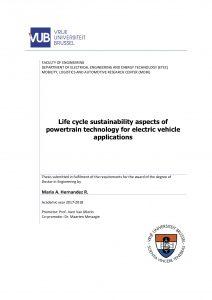
The expansion of the electric vehicle market will bring changes in the type of environmental, social and economic impact generated by the transport sector. To ensure an optimal sustainability performance, life cycle assessments can be useful to clarify whether important issues can be originated from the adoption of this clean technology, and to identify potential corrective measures to minimize the associated impacts. As such, this PhD research aims at contributing to the development of life cycle assessment methodologies, and to apply such contributions to the life cycle of electric powertrains.
In this PhD work, a detailed life cycle inventory of a state of the art electric motor and related power electronics, useful for the assessment of environmental, economic and social aspects is developed. A full environmental assessment of EV technology, and a developed eco-design tool that enables simple but accurate environmental impact assessments, complement this analysis. In the context of social-LCA, the applicability of input-output method for the study of socio-economic impacts is explored, and auxiliary methods proposed in order to overcome the limitations identified during the application of this method.
The results of the different assessments show that, the environmental performance of traction electric motors is closely tight to its efficiency. From a social point of view, it was found that significant negative impacts are generated during the manufacturing of the machine. This is due to the extraction and processing of gold, tin and tantalum used in printed circuit board, as important drivers of high social risk, in terms of child and forced labour, as well as corruption and armed conflicts, mainly in African countries. The phase-out of rare-earth elements from the motor design was proven positive from an environmental and social point of view, as well as favourable to reduce supply chain risks.
